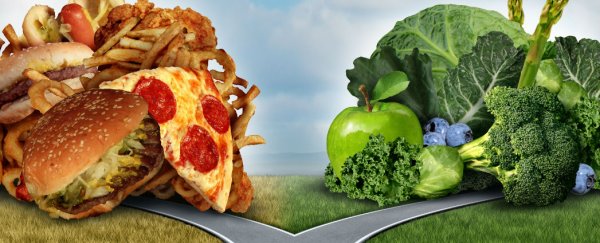Researchers have investigated what the popular 5:2 diet, also known the feast-or-famine diet, is doing to our bodies, and the results are looking pretty good for devotees. But, oddly enough, when they added antioxidant supplements to the mix, the benefits gained from the diet appeared to be counteracted.
The diet has been such a hit because for five days a week, you're allowed to eat whatever you like. You just have to pick two days in your week where your calorie intake is cut way down, to about 25 percent of your daily recommended intake. This might not be particularly pleasant, but unlike traditional diets where you're hungry all the time, for every day you're hungry on the 5:2 diet, you can look forward to eating whatever you like tomorrow. And by 'whatever you like', I mean up to 175 percent of your daily recommended intake of calories. Research has suggested that not only is 'intermittent fasting' great for a person's weight-loss motivation, it also has positive effects on their health.
Researchers from the University of Florida (UoF) and the Harvard Medical School in the US decided to investigate just how good it is for people's health, knowing that previous experiments with fasting mice had seen an increase in their lifespans.
They worked with 24 healthy participants aged between 19 and 30 who over a three-week period alternated between one day of eating 25 percent of their daily caloric intake, and the next, eating 175 percent of their daily caloric intake. For the men, this meant 650 calories on the fasting days and 4,550 calories on the feasting days, and for women, it was slightly less. The participants then spend another three weeks doing the same thing, but also taking antioxidant Vitamins C and E supplements in a pill form. The participants resumed their normal diets for two weeks between the two three-week periods to get them back to where they started.
Now let's just talk about what they actually ate for a second here, because it's amazing. According to the press release, on their fasting days, they ate just one meal, but it was a doozy - roast beef, gravy, and mashed potatoes, followed by Oreo cookies and orange sherbet. If that sounds like a feasting day to you, well, check this out - on the feasting days they ate bagels with cream cheese, oatmeal sweetened with honey and raisins, turkey sandwiches, apple sauce, spaghetti with chicken, yogurt, and soft drinks. Oh and they also got lemon pound cake, Snickers bars and vanilla ice cream. WHERE DO I SIGN UP.
"Most of the participants found that fasting was easier than the feasting day, which was a little bit surprising to me," said one of the team, Michael Guo from the Harvard Medical School. "On the feasting days, we had some trouble giving them enough calories."
Throughout the experiment, various factors were measured, including changes in weight, blood pressure, heart rate, glucose levels, cholesterol, and their levels of inflammation markers and genes called SIRT3, which are responsible for protective cell responses.
The researchers found that the act of intermittent fasting was causing a slight increase the SIRT3 and SIRT1 genes, which encode proteins called SIRT3 and SIRT1. These proteins belong to a class of proteins called sirtuins, which previous experiments have shown can extend the lifespan of mice if their levels are increased. But here's the catch - they only work in this way in response to oxidative stress, and the team found that they only increased during the three weeks were antioxidants were avoided. When the participants started taking the supplements, these increases disappeared.
Oxidative stress occurs when there are too many 'free radicals' - DNA-damaging toxins - for the body's immune response to handle, and this happens on a small scale when a person is fasting. In response, the body triggers the production of protective SIRT3 proteins. The same phenomenon could occur when you exercise - the 'good stress' you put your body under could be unnecessarily mitigated by the intake of extra antioxidants.
"The hypothesis is that if the body is intermittently exposed to low levels of oxidative stress, it can build a better response to it," study co-author Martin Wegman from the UoF College of Medicine said in a press release.
"You need some pain, some inflammation, some oxidative stress for some regeneration or repair," adds one of the team, Christiaan Leeuwenburgh from the Institute on Aging at the UoF. "These young investigators were intrigued by the question of whether some antioxidants could blunt the healthy effects of normal fasting."
Interestingly, the team found that the increase in SIRT 1 and 3 genes appeared even in the absence of weight-loss, which suggests weight-loss isn't the trigger here. They also found that levels of insulin dropped as a result of the diet, which means it could also have an anti-diabetic effect. They explain in the journal Rejuvenation Research:
We also found that plasma insulin levels decreased as a result of IF (the intermittent fasting diet), but not IFAO (the intermittent fasting with antioxidant supplementation diet). This suggests that the IF diet may have a beneficial effect on glucose metabolism by lower insulin levels, and perhaps have an anti-diabetic effect. Furthermore, the finding that IFAO did not lower insulin levels suggests that the insulin-lowering effects might be stimulated by IF-induced oxidative stress, which is quenched by the further antioxidant supplementation."
The sample size is pretty small, so it's not enough evidence to start cutting antioxidants out of your diet just yet, but it's a fascinating result all the same. And it shows that if you want roast beef and gravy with orange sherbet on top, it's okay with science (but probably not with any of the humans around you).
